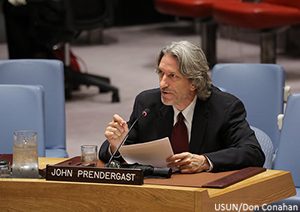
John Prendergast at the U.N. Security Council on September 10, 2018
On September 10th, the U.N. Security Council held a historic session on the role that corruption plays in fueling violent conflict and atrocities around the world.
John Prendergast, Founding Director of the Enough Project and Co-founder of The Sentry, briefed (Français, العربية) Security Council members on the urgent need for the international community to take action to address this crisis. Specifically, he described how the powerful tools of leverage such as network sanctions, anti-money laundering measures, and prosecutions by the International Criminal Court and other courts can change the incentive structure for the violent kleptocrats that cling to power while exploiting their countries’ natural resources and financial assets for self-enrichment. In attendance were representatives from the United States, the United Kingdom, France, Kazakhstan, Côte D’Ivoire, the Netherlands, Sweden, the Russian Federation, Peru, Bolivia, Kuwait, Equatorial Guinea, Poland, and Ethiopia.
Watch John Prendergast’s remarks:
Security Council members endorsed the Enough Project and The Sentry’s approach on countering violent kleptocracy:
In the most troubled countries in the world, corruption isn’t just simply part of the system, corruption is the system … Until there is a way to transparently distribute natural resource, in a way that is seen fair to the South Sudanese people, the civil war will continue” – Nikki Haley, U.S. Ambassador to the United Nations
No country is immune from corruption, and therefore the fight against corruption needs to begin in our nations’ capitals” – Karen Pierce, Representative from the United Kingdom
Corruption represents a threat to both security and development, it is an insidious evil that rots both” – François Delattre, Representative from France
If rule of law is the medicine for stability, then corruption is the virus that breeds conflict” – Lise Gregoire van Haaren, Representative from the Netherlands
Corruption cuts across entire populations, but hits the most disempowered members of society the hardest.” – Olof Skoog, Representative from Sweden
The Security Council managed to move from general sanctions to targeted, smart sanctions however we believe it is time to reevaluate this in a more accurate manner” – Monsour Ayyad Sh. A. Alotaibi, Representative from Kuwait
Corruption is a moral turpitude, and therefore its scope of influence will pervade all layers of official life” – Anatolio Ndong Mba, Representative from Equatorial Guinea
We call for enacting anti-money laundering measures where needed. Bodies like the Financial Action Task Force have developed international standards to combat money laundering and countries should use this toolbox of measures and implement at national levels. If these measures are implemented effectively by countries, it could create an environment where corruption, terrorist financing, or money laundering would not pass unnoticed.” – Joanna Wronecka, Representative from Poland
You can read John’s remarks here. (Français, العربية)
Want to take action? Help amplify this message and let members of the Security Council know that activists around the world want to break the links between conflict and corruption.

